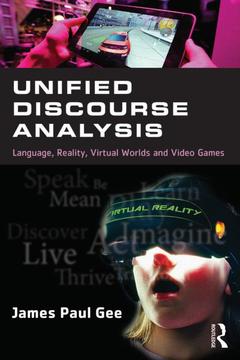Description
Unified Discourse Analysis
Language, Reality, Virtual Worlds and Video Games
Author: Gee James Paul
Language: English
Subjects for Unified Discourse Analysis:
Keywords
Grand Theft Auto; Discourse Analysis; Theory Craft; James Paul Gee; Ninja Gaiden; Unified Discourse Analysis; Interactive Communicational Form; Avatars; Hidden Affordances; Video Games; Metal Gear Solid; Multimodality; Big Lows; New media; Video Game Theory Reader; Digital Culture; Solid Snake; Massive Multiplayer Game; MIT Press; Effective Abilities; Avatar Function; Environmental Issue; Game Mechanics; Good Snake; Minimal Games; Virtual Character; Non-real Worlds; Real World Player; Deadly Shadows; Japanese Games; X-ray Vision; Cut Scenes; Proactive Agents
Publication date: 06-2014
Support: Print on demand
Publication date: 06-2014
Support: Print on demand
Description
/li>Contents
/li>Readership
/li>Biography
/li>
Discourse Analysis is becoming increasingly "multimodal", concerned primarily with the interplay of language, image and sound. Video Games allow humans to create, live in and have conversations with new multimodal worlds.
In this ground-breaking new textbook, best-selling author and experienced gamer, James Paul Gee, sets out a new theory and method of discourse analysis which applies to language, the real world, science and video games. Rather than analysing the language of video games, this book uses discourse analysis to study games as communicational forms. Gee argues that language, science, games and everyday life are deeply related and each is a series of conversations. Discourse analysis should not be just about language, but about human interactions with the world, with games, and with each other, interactions that make meaning and sustain lives amid risk and complexity.
Written in a highly accessible style and drawing on a wide range of video games from World of Warcraft and Chibi-Robo to Tetris, this engaging textbook is essential reading for students in discourse analysis, new media and digital culture.
1: Introduction 2: Language, Worlds, and Games 3: Avatars and Affordances 4: The Things We Can Be 5: Syntax and Semantics 6: Situated Meaning 7: An Interim Summary 8: A Unified Theory of Discourse Analysis 9: Chibi-Robo10: Metal Gear Solid 11: Projective Identity 12: Avatars and Big "D" Discourses 13: Non-Responsive Media 14: Alignment and Development




